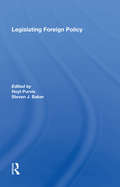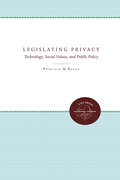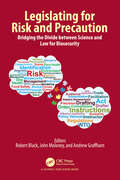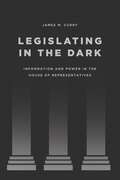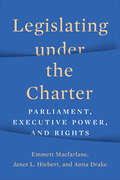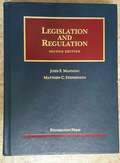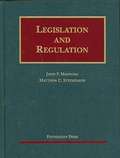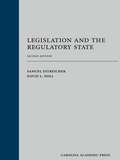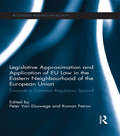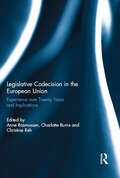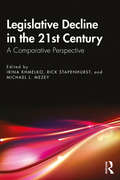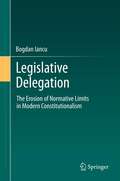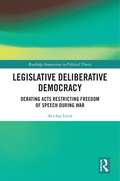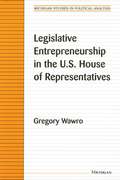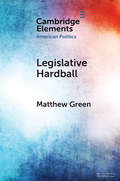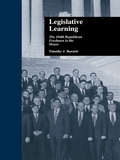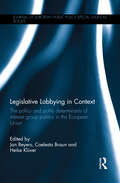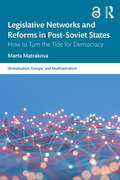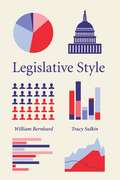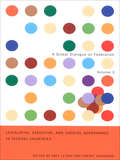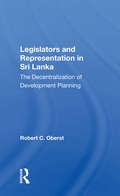- Table View
- List View
Legislating Foreign Policy
by Hoyt Purvis Steven J. BakerBeginning with the premise that Congress has reasserted its role in U.S. foreign policy, the authors of this book describe, analyze, and evaluate how Congress is exercising its formal and informal powers and responsibilities. Five policy studies examine congressional action in major policy areas, placing Congress's behavior in the institutional and
Legislating Instability: Adam Smith, Free Banking, and the Financial Crisis of 1722
by Tyler Beck GoodspeedFrom 1716 to 1845 Scottish banks were among the most dynamic and resilient in Europe, effectively absorbing economic shocks that rocked markets in London and on the continent. Tyler Beck Goodspeed explains the paradox that Scotland’s banking system achieved this success without the regulations Adam Smith considered necessary for economic stability.
Legislating Privacy: Technology, Social Values, and Public Policy
by Priscilla M. ReganWhile technological threats to personal privacy have proliferated rapidly, legislation designed to protect privacy has been slow and incremental. In this study of legislative attempts to reconcile privacy and technology, Priscilla Regan examines congressional policy making in three key areas: computerized databases, wiretapping, and polygraph testing. In each case, she argues, legislation has represented an unbalanced compromise benefiting those with a vested interest in new technology over those advocating privacy protection. Legislating Privacy explores the dynamics of congressional policy formulation and traces the limited response of legislators to the concept of privacy as a fundamental individual right. According to Regan, we will need an expanded understanding of the social value of privacy if we are to achieve greater protection from emerging technologies such as Caller ID and genetic testing. Specifically, she argues that a recognition of the social importance of privacy will shift both the terms of the policy debate and the patterns of interest-group action in future congressional activity on privacy issues.Originally published in 1995.A UNC Press Enduring Edition -- UNC Press Enduring Editions use the latest in digital technology to make available again books from our distinguished backlist that were previously out of print. These editions are published unaltered from the original, and are presented in affordable paperback formats, bringing readers both historical and cultural value.
Legislating for Risk and Precaution: Bridging the Divide between Science and Law for Biosecurity
by Robert Black John Moloney Andrew GraffhamThis book aims to demystify the law for scientists and instructing officials by exploring the science and legal concepts of risk and precaution for national legislation to facilitate safe trade in agricultural products (in compliance with international trade rules).The book is not meant to supplant the many authoritative titles on legislative drafting, but provide some practical exercises on instructions and drafting for this area of law. The book also includes some important factors in legal reform, such as the audience for and access to legislation. It, therefore, has the potential to be a valuable resource for coordinated training of instructors and drafters by helping to secure a robust two-way dialogue between them.
Legislating in the Dark: Information and Power in the House of Representatives (Chicago Studies in American Politics)
by James M. CurryThe 2009 financial stimulus bill ran to more than 1,100 pages, yet it wasn't even given to Congress in its final form until thirteen hours before debate was set to begin, and it was passed twenty-eight hours later. How are representatives expected to digest so much information in such a short time. The answer? They aren't. With Legislating in the Dark, James M. Curry reveals that the availability of information about legislation is a key tool through which Congressional leadership exercises power. Through a deft mix of legislative analysis, interviews, and participant observation, Curry shows how congresspersons--lacking the time and resources to study bills deeply themselves--are forced to rely on information and cues from their leadership. By controlling their rank-and-file's access to information, Congressional leaders are able to emphasize or bury particular items, exploiting their information advantage to push the legislative agenda in directions that they and their party prefer. Offering an unexpected new way of thinking about party power and influence, Legislating in the Dark will spark substantial debate in political science.
Legislating under the Charter: Parliament, Executive Power, and Rights
by Emmett Macfarlane Janet Hiebert Anna DrakeLegislating under the Charter explores how governments and Parliament justify limitations on rights when advancing laws that raise rights concerns or when responding to judicial decisions under the Canadian Charter of Rights and Freedoms. Through an analysis of legislation concerning criminal justice policy, the approval of new safe consumption sites, sex work, and medical assistance in dying, the book provides a detailed analysis of the extent and nature of parliamentary deliberation about rights, the extent to which government initiatives are properly scrutinized, and the broader institutional relationships under the Charter. The authors draw from a host of qualitative data, including research interviews and examination of judicial decisions, various bills under study, Hansard debates from the floor of the House of Commons, committee and Senate scrutiny of legislation, bureaucratic advice and Charter statements by the department of justice, and news media coverage. The book offers a set of concrete reform proposals to improve the transparency and accountability of executive and bureaucratic vetting processes, and to strengthen the role of Parliament in upholding constitutional values and holding the government to account. In doing so, Legislating under the Charter contributes to the broader comparative scholarship on models of judicial review, morality policy, policy change, and constitutionalism.
Legislation And Regulation (University Casebook Ser.)
by John F. Manning Matthew C. StephensonThe updated casebook, Manning and Stephenson's Legislation and Regulation, 2d, is designed for a first-year class on Legislation & Regulation, and provides a proven, ready-to-use set of materials for those interested in introducing such a class to their 1L curriculum. The book focuses on the tools and methods of interpreting legal texts, using Supreme Court and other appellate decisions as the primary texts, yet the note material gently introduces students to applicable insights from political science, history, economics, and philosophy. The book aims to familiarize students with tools and techniques that lawyers and judges use when crafting legal arguments in statutory or regulatory contexts, and to give students a sense of the larger questions of institutional design implicated by these interpretive questions.
Legislation and Regulation
by John F. Manning Matthew C. StephensonThis casebook is specifically designed for a first-year class on Legislation Regulation, and provides a proven, ready-to-use set of materials for schools or instructors interested in introducing such a class to their 1L curriculum.
Legislation and the Regulatory State
by Samuel Estreicher David L. NollEstreicher & Noll's Legislation and the Regulatory State provides an accessible, up-to-date introduction to the institutions and procedures of the modern regulatory state. Designed to emphasize regulatory policy and the practical aspects of administrative lawyering, the casebook explores Congress's reasons for regulating and the choices it makes when enacting legislation, the legislative process and tools of statutory interpretation, administrative agencies' position within the Constitution's system of separated powers, the Administrative Procedure Act, and judicial review of agency action.
Legislative Approximation and Application of EU Law in the Eastern Neighbourhood of the European Union: Towards a Common Regulatory Space? (Routledge Research in EU Law)
by Peter Van Elsuwege and Roman PetrovThis book explores the exportation and application of European Union legislation beyond EU borders. It clarifies the means and instruments of the voluntary application of the EU’s norms by third countries and analyses in detail the process of legislative approximation between the EU and its East European neighbours. It also assesses the extent to which the EU is successful in promoting its legal standards abroad. The first part of the book addresses the EU’s mechanisms and instruments promoting the export of its own laws and practices to other countries. Key issues include the post-Lisbon constitutional basis for the EU’s engagement with its Eastern neighbours (Art. 8 TEU); the different methods of acquis export and the impact of a new generation of Association Agreements providing for the establishment of Deep and Comprehensive Free Trade Areas (DCFTAs) and, ultimately, a Neighbourhood Economic Community (NEC) between the EU and its Eastern partners. The second part of the book includes substantive country reports that analyse the process of legislative approximation and application of EU law in the Eastern Partnership countries and Russia, authored by leading academics from the countries concerned. While currently these countries are not working towards full EU membership, the EU encourages them to approximate and converge their legislation with the EU acquis. The book also offers a unique picture of current practice of the application of EU law by judiciaries in the countries of the Eastern Partnership and Russia. The book concludes with reflections on the multi-faceted character of legislative approximation and the challenges surrounding the application of EU law in the EU’s Eastern neighbourhood. The conclusions reached are highly informative as to the effectiveness of present and future EU external regional policies aimed at the promotion of EU common values and EU legislation into the legal orders of third countries.
Legislative Codecision in the European Union: Experience over Twenty Years and Implications (ISSN)
by Anne Rasmussen, Charlotte Burns and Christine RehThis volume takes stock of twenty years of practising and studying codecision in the European Union (EU) and examines the procedure‘s long-term implications for the EU‘s institutions, politics and policies. The introduction of co-legislation between the Council of Ministers and the European Parliament in 1993 raised the prospect of increased parliamentary involvement in EU decision-making and promised a new era of more transparent, inclusive and accountable policy-making. This collection draws together contributions from diverse theoretical and methodological perspectives in order to analyse the extent to which codecision has delivered the expected gains and to review the unexpected effects that have followed from its introduction, such as the growing informalisation of EU decision-making. Using a combination of in-depth qualitative case studies, wider quantitative analyses, practitioners insights and a review of the procedure‘s democratic legitimacy the contributions offer a holistic assessment of the effect of co-decision on the political system of the EU.This book was published as a special issue of the Journal of European Public Policy.
Legislative Decline in the 21st Century: A Comparative Perspective
by Michael L. Mezey Rick Stapenhurst Irina KhmelkoIrina Khmelko, Frederick Stapenhurst, and Michael L. Mezey have assembled an authoritative guide to the declining institutional capacities of legislatures around the world. Case studies represent a diverse sample of countries, ranging from newer democracies emerging from the post-communist world to more established but at times fragile democracies in Asia. Although largely focused on newer democratic systems, readers will be able to identify key factors that explain the general global trend toward the empowerment of executives at the expense of national legislatures. The cases, although different from one another, identify several factors that have explained the erosion of legislative power, including historical legacies, institutional design, economic factors, external factors, political polarization, personalization of politics, and the rise of populism. Original data and the presentation of testable theoretical propositions about the growing imbalance between executives and national legislatures moves the field in a promising new direction. Legislative Decline in the 21st Century will be of interest to students and scholars of Legislative Studies and Comparative Politics. Lessons drawn from these case studies will allow policy makers to explore new solutions that can lead to the improved quality of democracy in countries around the world.
Legislative Delegation
by Bogdan IancuAn overarching question of contemporary constitutionalism is whether equilibriums devised prior to the emergence of the modern administrative-industrial state can be preserved or recreated by means of fundamental law. The book approaches this problem indirectly, through the conceptual lens offered by constitutional developments relating to the adoption of normative limitations on the delegation of law-making authority. Three analytical strands (constitutional theory, constitutional history, and contemporary constitutional and administrative law) run through the argument. They merge into a broader account of the conceptual ramifications, the phenomenon, and the constitutional treatment of delegation in a number of paradigmatic legal systems. As it is argued, the development and failure of constitutional rules imposing limits on legislative delegation reveal the conditions for the possibility of classical limited government and, conversely, the erosion of normativity in contemporary constitutionalism.
Legislative Deliberative Democracy: Debating Acts Restricting Freedom of Speech during War (Routledge Innovations in Political Theory)
by Avichai LevitFreedom of speech is a basic right in a democracy. During war however, national legislatures tend to enact laws that restrict this basic right. Under what circumstances can such laws be democratically legitimate? Avichai Levit argues that the degree of democratic legitimacy of laws that restrict freedom of speech during war, depends on the extent of legislature deliberation on such laws. The more law makers in both chambers of the legislature, seriously consider information and arguments, reason on the common good, and seek to persuade and decide the best legislative outcome, in committees and on the floor, the more democratic legitimacy can be associated with such laws. This book fills a gap in the scholarly literature regarding the evaluation of the democratic legitimacy of laws restricting freedom of speech during war, by bridging different theoretical perceptions and presenting an alternative normative account of deliberative democracy which focuses on the deliberations of a national legislature. Using the United States as a case study, this book goes into the details of Congressional deliberation during World War I, World War II and the Cold War, as well as the political histories that brought about such laws. Legislative Deliberative Democracy will be of interest to academics and students alike in the fields of American Constitutional law, Political theory, American politics and political history.
Legislative Development in Africa: Politics and Postcolonial Legacies
by Ken OpaloWhat explains contemporary variations in African legislative institutions – including their strengths and weaknesses? Compared with the more powerful executive branches, legislatures throughout the continent have historically been classified as weak and largely inconsequential to policy-making processes. But, as Ken Ochieng' Opalo suggests here, African legislatures actually serve important roles, and under certain conditions, powerful and independent democratic legislatures can emerge from their autocratic foundations. In this book, Opalo examines the colonial origins of African legislatures, as well as how postcolonial intra-elite politics structured the processes of adapting inherited colonial legislatures to local political contexts and therefore continued legislative development. Through case studies of Kenya and Zambia, Opalo offers a comparative longitudinal study of the evolution of legislative strength and institutionalization as well as a regional survey of legislative development under colonial rule, postcolonial autocratic single-party rule, and multiparty politics throughout Africa.
Legislative Effectiveness in the United States Congress
by Craig Volden Alan E. WisemanThis book explores why some members of Congress are more effective than others at navigating the legislative process and what this means for how Congress is organized and what policies it produces. Craig Volden and Alan E. Wiseman develop a new metric of individual legislator effectiveness (the Legislative Effectiveness Score) that will be of interest to scholars, voters, and politicians alike. They use these scores to study party influence in Congress, the successes or failures of women and African Americans in Congress, policy gridlock, and the specific strategies that lawmakers employ to advance their agendas.
Legislative Entrepreneurship in the U.S. House of Representatives
by Gregory WawroWhen members are elected to the House of Representatives they have a certain freedom to decide how they will act as members and how they will build their reputations. Just as in the market place entrepreneurs build businesses, so in the House of Representatives members have the freedom to choose to build legislative programs that will enhance their reputations in the institution. And yet entrepreneurship is also costly to members. Gregory Wawro explains why members of the House engage in legislative entrepreneurship by examining what motivates them to acquire policy knowledge, draft legislation, build coalitions, and push their legislation in the House. He considers what incentives members have to perform what many have perceived to be the difficult and unrewarding tasks of legislating. This book shows how becoming a legislative entrepreneur relates to members' goals of reelection, enacting good public policy, and obtaining influence in the House. The analysis differs from previous studies of this behavior, which for the most part have employed case study methods and have relied on anecdotal evidence to support their arguments. Wawro analyzes legislative entrepreneurship in a general and systematic fashion, developing hypotheses from rational-choice-based theories and testing these hypotheses using quantitative methods. Wawro argues that members engage in legislative entrepreneurship in order to get ahead within the House. He finds that the more legislative entrepreneurship that members engage in, the more likely it is that they will advance to prestigious positions. This book is of interest to students of Congress, legislative behavior and institutions, elections, and campaign finance. Gregory Wawro is Assistant Professor of Political Science, Columbia University.
Legislative Hardball: The House Freedom Caucus and the Power of Threat-Making in Congress (Elements in American Politics)
by Matthew GreenAssertive bargaining occurs from time to time in the US Congress. It became an important feature of legislative negotiations within the House Republican Party when, following the 2014 elections, a group of organized conservatives called the House Freedom Caucus regularly issued threats against its own party's leadership. Such behavior by an ideologically extreme bloc of lawmakers is not accounted for by existing theories of legislative politics. This Element posits explanations for why such threat-making might occur and what might increase its likelihood of success, then tests those explanations using the Freedom Caucus as a case study.
Legislative Learning: The 104th Republican Freshmen in the House (Politics and Policy in American Institutions #Vol. 1414)
by Timothy J. BarnettBarnett shows how political environments can produce legislators who place a premium on their policy-making goals through a nuanced exploration of factors undergirding member perceptions, policy ambitions, class cohesion, and legislative learning.
Legislative Lobbying in Context: The Policy and Polity Determinants of Interest Group Politics in the European Union (ISSN)
by Jan Beyers, Caelesta Braun and Heike KlüverThe lack of previous research into political interest groups and taking into account policy-specific and institutional context characteristics is largely due to research designs that have been primarily focused on a small number of policy debates, with the result that contextual characteristics were largely held constant. This book brings together articles from different modules that are part of a larger European Collaborative Research Project, INTEREURO, carried out by research teams in nine different countries under the auspices of the European Science Foundation. The main goal of the book is to analyse strategies, framing and influence processes for a set of 125 legislative proposals submitted by the European Commission, in an effort to better understand the involvement of interest organizations in the decision-making process of the EU. Contributors draw on sophisticated and innovative policy-driven samples of interest group mobilization, allowing them to account systematically for how policy-specific and institutional context factors shape mobilization, lobbying strategies and influence of interest groups on public policy debates in the EU. In this way, the book makes an important contribution to the study of interest groups in the EU and represents the breadth of positions taken in the current literature. This book was originally published as a special issue of the Journal of European Public Policy.
Legislative Networks and Reforms in Post-Soviet States: How to Turn the Tide for Democracy (Globalisation, Europe, and Multilateralism)
by Marta MatrakovaThis book presents the legislative networks in charge of drafting democratic reforms as gatekeepers to the actual adoption, implementation and internalisation of democratic norms in selected post-Soviet countries.It demonstrates that the composition of legislative networks which draft the legal reforms in Armenia, Georgia and Moldova, is controlled by powerful political actors who seek to have their preferences reflected in the reform outcomes. Furthermore, the book shows that there are limited modifications after the adoption of the first draft by these legislative networks, despite the later reform stages being the focus of the existing literature. The book’s analysis of political reforms in the Rule of Law, inter-institutional and electoral accountability in these three countries identifies the control strategies used by domestic political elite to restrain the space for democratisation, while instrumentalising the institutional framework to increase its power.This book will be of key interest to scholars and students of democratisation, post-Soviet studies, East European politics, EU politics and policy, comparative politics and international relations.
Legislative Style
by Tracy Sulkin William BernhardOnce elected, members of Congress face difficult decisions about how to allocate their time and effort. On which issues should they focus? What is the right balance between working in one’s district and on Capitol Hill? How much should they engage with the media to cultivate a national reputation? William Bernhard and Tracy Sulkin argue that these decisions and others define a “legislative style” that aligns with a legislator’s ambitions, experiences, and personal inclinations, as well as any significant electoral and institutional constraints. Bernhard and Sulkin have developed a systematic approach for looking at legislative style through a variety of criteria, including the number of the bills passed, number of speeches given, amount of money raised, and the percentage of time a legislator voted in line with his or her party. Applying this to ten congresses, representing twenty years of congressional data, from 1989 to 2009, they reveal that legislators’ activity falls within five predictable styles. These styles remain relatively consistent throughout legislators’ time in office, though a legislator’s style can change as career goals evolve, as well as with changes to individual or larger political interests, as in redistricting or a majority shift. Offering insight into a number of enduring questions in legislative politics, Legislative Style is a rich and nuanced account of legislators’ activity on Capitol Hill.
Legislative, Executive, and Judicial Governance in Federal Countries
by Katy Le Roy Cheryl SaundersComparative studies examine the constitutional design and actual operation of governments in Argentina, Australia, Austria, Canada, Germany, India, Nigeria, Russia, South Africa, Switzerland, and the United States. Contributors analyze the structures and workings of legislative, executive, and judicial institutions in each sphere of government. They also explore how the federal nature of the polity affects those institutions and how the institutions in turn affect federalism. The book concludes with reflections on possible future trends.
Legislator Success in Fragmented Congresses in Argentina
by Ernesto Calvo"Plurality-led Congresses are among the most pervasive and least studied phenomena in presidential systems around the world. Often conflated with divided government, where an organized opposition controls a majority of seats in congress, plurality-led congresses are characterized by a party with fewer than 50 percent of the seats still in control of the legislative gates. Extensive gatekeeping authority without plenary majorities, this book shows, leads to policy outcomes that are substantially different from those observed in majority-led congresses. Through detailed analyses of legislative success in Argentina and Uruguay, this book explores the determinants of law enactment in fragmented congresses. It describes in detail how the lack of majority support explains legislative success in standing committees, the chamber directorate, and the plenary floor"--
Legislators And Representation In Sri Lanka: The Decentralization Of Development Planning
by Robert C. OberstFocusing on the work of Sri Lankan legislators, this book offers a model of representation in examining parliamentary systems, especially those found in the Third World. It explores an important part of legislators' responsibilities as the country seeks to decentralize its development planning.
